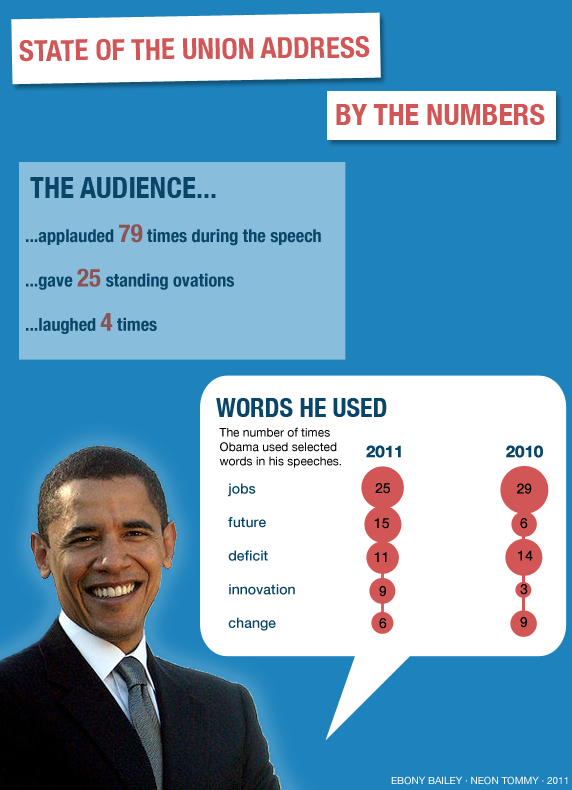Obama Emphasizes Economy In State Of The Union Address

“What comes of this moment will be determined not by whether we can sit together tonight, but whether we can work together tomorrow,” Obama said. “We will move forward together, or not at all – for the challenges we face are bigger than party, and bigger than politics.”
Highlighting the economy throughout his speech, Obama reminded the nation of the sound recovery made from the 2008 economic recession. To sustain the U.S. economy, Obama proposed a freeze in annual domestic spending for the next five years.
“This would reduce the deficit by more than $400 billion over the next decade, and will bring discretionary spending to the lowest share of our economy since Dwight Eisenhower was president,” Obama said.
Other goals set during the address included Obama’s plan to double U.S. exports by 2014 through agreements with India and China – the agreement is expected to support more than 250,000 jobs in the U.S. He also set the goal of having 1 million Americans drive electric cars by 2015 and 80 percent of the nation’s electricity come from clean energy sources – such as wind, solar, biofuel and nuclear – by 2035.
A summary of Obama's State of the Union address can be found here.
“We need to out-innovate, out-educate, and out-build the rest of the world… [And] the first step in winning the future is encouraging American innovation,” Obama said.
Within the next five years, Obama said he will make it possible for businesses to deploy high-speed wireless coverage to 98 percent of all Americans. He also said that within 25 years, he hopes to provide 80 percent of Americans access to high-speed rail.
For Obama, what’s “at stake” for the nation is not only whether new jobs and industries take root in the U.S., but whether hard working Americans are compensated appropriately for their work.
Obama also lauded Congress’s extension of the Bush tax cuts last December for Americans making $250,000 or less and the newfound ability for U.S. businesses to write off all investments they make in 2011.
“These steps, taken by Democrats and Republicans, will grow the economy and add to the more than one million private sector jobs created last year,” Obama said. “We are living with a legacy of deficit-spending that began almost a decade ago. But now that the worst of the recession is over, we have to confront the fact that our government spends more than it takes in. That is not sustainable.”
However, the President responded to Republican plans to further cut spending as a potential mishap that would threaten the nation’s competitiveness in the global market.
“I recognize that some in this Chamber have already proposed deeper cuts, and I’m willing to eliminate whatever we can honestly afford to do without. But let’s make sure that we’re not doing it on the backs of our most vulnerable citizens," he said. "Cutting the deficit by gutting our investments in innovation and education is like lightening an overloaded airplane by removing its engine."
The President also called on Congress to eliminate the billions of dollars currently given to the nation’s oil companies.
“I don’t know if you’ve noticed, but they’re doing just fine on their own,” he said. “So instead of subsidizing yesterday’s energy, let’s invest in tomorrow’s.”
Faced with a Republican-controlled House for the first time during his presidency, Obama’s tenets of nonpartisanship and cooperation will be thoroughly tested for the next two years. Congress now boasts 96 new members and a net gain of 63 seats for the Republicans.
During the first half of his presidency, Obama was successful in delivering on a number of promises he presented to the nation during his historical ascension to office.
Under Obama’s guise, Congress successfully passed a health care reform bill, increasing access to affordable health care for a greater number of Americans and insuring that insurance companies would not deny children with preexisting conditions coverage. He shored up Wall Street regulations to prevent a financial meltdown analogous to the 2008 economic recession and overturned the military’s infamous “Don’t Ask, Don’t Tell” policy.
Problems at home have, however, forced the President to refocus his efforts internally rather than on the nation’s foreign policy, as articulated during his inaugural address. Although U.S. military presence in Iraq continues to decline, Obama has expanded troop levels in Afghanistan to over 100,000 troops.
Additionally, U.S. home prices continue to fall for the fourth time in four months, following their rebound from last year.
In the beginning of his address, the President thanked the House’s new speaker, Rep. John Boehner, and honored Dem. Gabby Giffords to thunderous applause from the audience. The President’s annual address was given to a joint session of Congress from the House Chamber at the U.S. Capitol.

CLICK HERE TO VIEW NEON TOMMY'S ANALYSIS ON OBAMA'S PRESIDENCY AFTER TWO YEARS.
To reach Benjamin Gottlieb, click here.
Or follow him on Twitter @benjamin_max.



